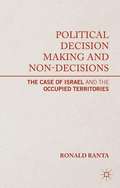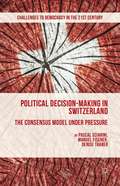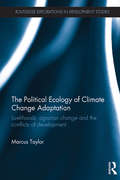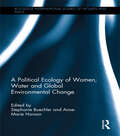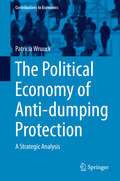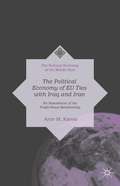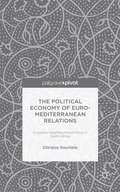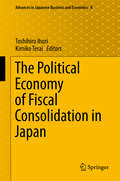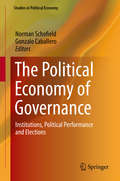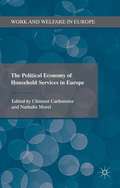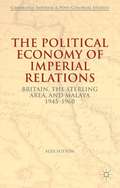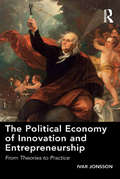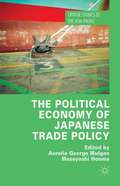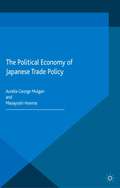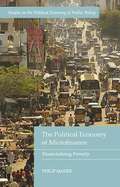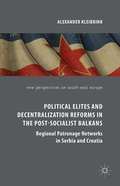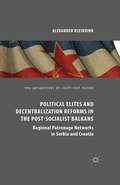- Table View
- List View
Political Decision Making and Non-Decisions
by Ronald RantaThis book examines Israel's relationship and political decision-making process towards the Occupied Territories from the aftermath of the Six Day War to the Labour Party's electoral defeat in 1977. The period represents the first decade of Israel's occupation of the Occupied Territories and the last decade in which the Labour Party was Israel's most dominant political force. Arguing that the successive Israeli governments headed by the Labour Party lacked a strategic policy towards the Occupied Territories to address the country's objectives and needs, this book demonstrates the detrimental effect this had on Israel, on the Middle East in general, and on the Palestinian people in particular. In addressing key aspects of decision making pathologies, this book raises issues which remain important features of Israeli politics today and an analysis relevant for political decision making worldwide.
Political Decision-Making in Switzerland
by Pascal Sciarini Manuel Fischer Denise TraberThe Swiss consensus democracy model has been – and remains – under pressure. While being a non-EU member, Switzerland is heavily influenced by European integration and exemplifies some of the crucial changes at work on the continent. Based on a rich collection of data covering the 11 most important Swiss decision-making processes in recent years, this book highlights these changes and related variations across policy domains. It examines Europeanization as a major driving factor in the strengthening of bureaucratic policy-making, and charts the decline of corporatist policy-making and reinforcement of partisan politics as a result of institutional reforms, mediatization, higher polarization among social partners and the rise of a populist right wing party. Switzerland has moved away from the ideal-type of consensus. Coalitions have become more unstable and policy outputs less predictable, yet this may be good news in terms of innovation.
The Political Development of Modern Thailand
by Federico FerraraBased on extensive, empirical research, The Political Development of Modern Thailand analyses the country's political history from the late nineteenth century to the present day. Long known for political instability, Thailand was thrust into a deep state of crisis by a royalist military coup staged in 2006. Since then, conservative royalists have overthrown more elected governments after violent street protests, while equally disruptive demonstrations staged by supporters of electoral democracy were crushed by military force. Federico Ferrara traces the roots of the crisis to unresolved struggles regarding the content of Thailand's national identity, dating back to the abolition of absolute monarchy in 1932. He explains the conflict's re-intensification with reference to a growing chasm between the hierarchical worldview of Thailand's hegemonic 'royal nationalism' and the aspirations that millions of ordinary people have come to harbour as a result of modernisation.
The Political Ecology of Climate Change Adaptation: Livelihoods, agrarian change and the conflicts of development (Routledge Explorations in Development Studies)
by Marcus TaylorThis book provides the first systematic critique of the concept of climate change adaptation within the field of international development. Drawing on a reworked political ecology framework, it argues that climate is not something ‘out there’ that we adapt to. Instead, it is part of the social and biophysical forces through which our lived environments are actively yet unevenly produced. From this original foundation, the book challenges us to rethink the concepts of climate change, vulnerability, resilience and adaptive capacity in transformed ways. With case studies drawn from Pakistan, India and Mongolia, it demonstrates concretely how climatic change emerges as a dynamic force in the ongoing transformation of contested rural landscapes. In crafting this synthesis, the book recalibrates the frameworks we use to envisage climatic change in the context of contemporary debates over development, livelihoods and poverty. With its unique theoretical contribution and case study material, this book will appeal to researchers and students in environmental studies, sociology, geography, politics and development studies.
A Political Ecology of Women, Water and Global Environmental Change (Routledge International Studies of Women and Place)
by Stephanie Buechler Anne-Marie S. HansonThis edited volume explores how a feminist political ecology framework can bring fresh insights to the study of rural and urban livelihoods dependent on vulnerable rivers, lakes, watersheds, wetlands and coastal environments. Bringing together political ecologists and feminist scholars from multiple disciplines, the book develops solution-oriented advances to theory, policy and planning to tackle the complexity of these global environmental changes. Using applied research on the contemporary management of groundwater, springs, rivers, lakes, watersheds and coastal wetlands in Central and South Asia, Northern, Central and Southern Africa, and South and North America, the authors draw on a variety of methodological perspectives and new theoretical approaches to demonstrate the importance of considering multiple layers of social difference as produced by and central to the effective governance and local management of water resources. This unique collection employs a unifying feminist political ecology framework that emphasizes the ways that gender interacts with other social and geographical locations of water resource users. In doing so, the book further questions the normative gender discourses that underlie policies and practices surrounding rural and urban water management and climate change, water pollution, large-scale development and dams, water for crop and livestock production and processing, resource knowledge and expertise, and critical livelihood studies. This book will be of interest to students and scholars of environmental studies, development studies, feminist and environmental geography, anthropology, sociology, environmental philosophy, public policy, planning, media studies, Latin American and other area studies, as well as women’s and gender studies.
Political Economies of Empire in the Early Modern Mediterranean
by Maria FusaroAgainst the backdrop of England's emergence as a major economic power, the development of early modern capitalism in general and the transformation of the Mediterranean, Maria Fusaro presents a new perspective on the onset of Venetian decline. Examining the significant commercial relationship between these two European empires during the period 1450–1700, Fusaro demonstrates how Venice's social, political and economic circumstances shaped the English mercantile community in unique ways. By focusing on the commercial interaction between Venice and England, she also re-establishes the analysis of the maritime political economy as an essential constituent of the Venetian state political economy. This challenging interpretation of some classic issues of early modern history will be of profound interest to economic, social and legal historians and provides a stimulating addition to current debates in imperial history, especially on the economic relationship between different empires and the socio-economic interaction between 'rulers and ruled'.
A Political Economy of American Hegemony
by Thomas OatleyIn A Political Economy of American Hegemony, Thomas Oatley explores how America's military buildups have produced postwar economic booms that have culminated in monetary and financial crises. The 2008 subprime crisis - as well as the housing bubble that produced it - was the most recent manifestation of this buildup, boom, and bust cycle, developing as a consequence of the decision to deficit-finance the wars in Afghanistan and Iraq. Earlier instances of financial crises were generated by deficit-financed buildups in the 1980s and the late 1960s. The buildup, boom, and bust pattern results from the way political institutions and financial power shape America's response to military challenges: political institutions transform increased military spending into budget deficits, and financial power enables the United States to finance these deficits by borrowing cheaply from the rest of the world. Oatley examines how this cycle has had a powerful impact on American and global economic and financial performance.
The Political Economy of Anti-dumping Protection
by Patricia WruuckThis book deals with anti-dumping measures (AD) and investigates two questions: First, what country characteristics affect AD use and notably, do domestic political institutions have an effect? Second, (how) is the decision to impose a new AD measure affected by anticipation of trading partners' potential retaliation? This book applies a strategic perspective to AD to address these questions, presenting a game-theoretic model together with an empirical test. The approach sheds light on the dynamics of interaction between trading partners and allows to capture selection processes which underpin the trade restrictions that can actually be observed. The book provides a fresh look on when and how trading powers apply antidumping measures, how this is shaped by strategic interaction and whether institutions do make a difference to the outcome. In a period in which the international trading system has to cope with numerous stresses such as an increased resort to administered protection largely by big emerging economies, this is a timely and important contribution. Dr. Klaus Günter Deutsch, Managing Director, Research, Economic and Industrial Policy, German Federation of Industries This book successfully integrates two research traditions in international politics - the traditional view that looks at domestic factors of anti-dumping policies and the strategic view that conditions the imposition of anti-dumping measures on the likely, retaliatory behavior of the trading partner. The result is an informative and constructive examination of anti-dumping protection and trade wars in the WTO. Prof. Dr. Thomas Bräuninger, Chair of Political Economy, University of Mannheim, Germany "The Political Economy of Anti-Dumping Protection - A Strategic Analysis" is a major contribution to the important and growing field international political economy. Starting with the "traditional" comparative institutional analysis, which focuses on the implications of democratic and non-democratic regimes for using anti-dumping measures in trade politics, the second part applies a strategic perspective on this type of sanctions uncovering the dynamic interactions between a challenging and challenged countries. For all those interested in understanding the logic of sanctions, the role of institutions, and in how to examine the implications of theoretical models for international political economy this book is a "must read". Prof. Dr. Thomas König, Chair of Political Science II, University of Mannheim, Germany.
The Political Economy of Conflict in South Asia
by Matthew J. Webb Albert WijeweeraDestructive conflicts have thwarted growth and development in South Asia for more than half a century. This collection of multi-disciplinary essays examines the economic causes and consequences of military conflict in South Asia from a variety of perspectives embracing fiscal, social, strategic, environmental and several other dimensions.
The Political Economy of EU Ties with Iraq and Iran
by Amir M. KamelThis book analyzes the failure of the EU's peace-through-trade policy in Iraq and Iran between 1979 and 2009 from a theoretical and empirical perspective. The author adds to the trade-peace theory debate and provides evidence supporting the need to review the EU's peace-through-trade-policy towards Iraq and Iran, and in general.
The Political Economy of Euro-Mediterranean Relations: European Neighbourhood Policy in North Africa
by Christos KourtelisThe author analyses the implementation of the agricultural and industrial parts of the European Neighbourhood Policy (ENP) in Egypt, Tunisia and Morocco. This study forms the first comprehensive attempt to examine the EU-led reforms and initiatives in the two sectors up until the beginning of the Arab Spring. It also evaluates the development of the policy after the changes of the regimes in Tunisia and Egypt until the 2014 elections which brought Sisi in power in Egypt and Essebsi in Tunisia. Following a sectoral approach to assess the implementation of the ENP, Christos Kourtelis investigates which interest groups win and which lose from the policy.
The Political Economy of Fiscal Consolidation in Japan
by Toshihiro Ihori Kimiko TeraiThis book investigates the reasons for persistent public deficits and delayed fiscal reform in Japan, placing a special emphasis on political economy aspects. Japan is confronted with the need to pursue fiscal discipline for fiscal consolidation and implement structural reforms for reorganizing fiscal expenditures. Focusing on particular policy fields including social security, female labor supply, public works, and intergovernmental transfer schemes, the book clarifies economic and political elements that have hindered effective steps toward these two goals. Facing population aging and a business downturn, the Japanese government was urged to increase social security expenditures and the budget for Keynesian stimulus policies. As elucidated in the book, the institutional design has worked to over-represent the demands of elderly generations and local interest groups and to expand these expenditures. Rigorous theoretical and numerical analyses reported throughout the book consequently provide readers with insights into incentive designs and institutional reforms necessary for fiscal consolidation, also presenting points of view for public policy and public debate.
The Political Economy of Governance
by Norman Schofield Gonzalo CaballeroUnderstanding the governance of nations is a key challenge in contemporaneous political economy. This book provides new advances and the latest research in the field of political economy, dealing with the study of institutions, governance, democracy and elections. The volume focuses on issues such as the role of institutions and political governance in society, the working of democracy and the electoral performance in several case studies. The chapters involve cutting edge research on many different countries, including the USA, Great Britain, Germany, Spain and the Third World. The authors of the chapters are leading scholars in political economy from America, Europe and Asia.
The Political Economy of Household Services in Europe (Work And Welfare In Europe)
by Nathalie Morel Clément CarbonnierThe Political Economy of Household Services in Europe.
The Political Economy of Household Services in Europe (Work and Welfare in Europe)
by Clément CarbonnierThis edited volume assesses from a variety of perspectives the policies introduced to support the development of household services across Europe. It highlights the impact of these costly policies on the creation of low quality jobs and on labour market dualisation, and questions their social and economic outcomes.
The Political Economy of Imperial Relations: Britain, the Sterling Area, and Malaya 1945-1960 (Cambridge Imperial and Post-Colonial Studies)
by Alex SuttonThe Political Economy of Imperial Relations offers a much needed historical and theoretical intervention into the relationship between Britain and Malaya after the Second World War. It challenges existing accounts and details a strong continuity in this relationship from 1945 until 1960.
The Political Economy of Innovation and Entrepreneurship: From Theories to Practice
by Ivar JonssonThis book offers a general theoretical framework for approaching innovation and entrepreneurship, using practical and up-to-date examples to demonstrate three different levels of innovation and entrepreneurship: the macro-level, which concerns the impact of innovation activity on economic growth and production systems; the meso-level, which concerns the relations between firms, research institutes and governmental bodies and their role in innovation activity; and the micro-level, which concerns the dynamics of innovations within firms and organisations. Providing a critical overview of existing research and demonstrating the importance of a transdisciplinary framework for studies of innovation and entrepreneurship, the author advances a general concept of ’collective entrepreneurship’ that emphasises the social and collaborative nature of innovation and entrepreneurship, thus shedding light on processes of innovation and entrepreneurship as active practices of social construction. As such, it will appeal to scholars of economic sociology, political science, economic geography and economists, as well as those with interests in innovation policy.
The Political Economy of Japanese Trade Policy (Critical Studies of the Asia-Pacific)
by Aurelia George Mulgan Masayoshi HonmaThe Political Economy of Japanese Trade Policy.
The Political Economy of Japanese Trade Policy (Critical Studies of the Asia-Pacific)
by Aurelia George Mulgan Masayoshi HonmaThis study provides up-to-date coverage of the most important domestic and external political and economic influences on Japanese trade policy, as well as the evolutionary dynamics of that policy in the post-war period.
The Political Economy of Microfinance
by Philip MaderThis book helps to understand the enigmatic microfinance sector by tracing its evolution and asking how it works as a financial system. Our present capitalism is a financialized capitalism, and microfinance is its response to poverty. Microfinance has broad-ranging effects, reaching hundreds of millions of people and generating substantial revenues. Although systemic flaws have become obvious, most strikingly with the 2010 Indian crisis that was marked by overindebtedness, suicides and violence, the industry's expansion continues unabated. As Philip Mader argues, microfinance heralds less the end of poverty than new, more financialized forms of poverty. While microfinance promises to empower, it generates discipline and extracts substantial resources from the poor, producing new crises and new forms of dispossession.
The Political Economy of Rare Earth Elements: Rising Powers and Technological Change (International Political Economy Series)
by Ryan David KigginsThe Political Economy of Rare Earth Elements.
The Political Economy of Rare Earth Elements: Rising Powers and Technological Change (International Political Economy Series)
by Ryan David KigginsThe contributors argue that rare earths are essential to the information technology revolution on which humans have come to depend for communication, commerce, and, increasingly, engage in conflict. They demonstrate that rare earths are a strategic commodity over which political actors will and do struggle for control.
A Political Economy of the Senses: Neoliberalism, Reification, Critique (New Directions in Critical Theory #2)
by Anita ChariAnita Chari revives the concept of reification from Marx and the Frankfurt School to spotlight the resistance to neoliberal capitalism now forming at the level of political economy and at the more sensate, experiential level of subjective transformation. Reading art by Oliver Ressler, Zanny Begg, Claire Fontaine, Jason Lazarus, and Mika Rottenberg, as well as the politics of Occupy Wall Street, Chari identifies practices through which artists and activists have challenged neoliberalism's social and political logics, exposing its inherent tensions and contradictions.
Political Elites and Decentralization Reforms in the Post-Socialist Balkans: Regional Patronage Networks in Serbia and Croatia (New Perspectives on South-East Europe)
by Alexander KleibrinkAcross the globe, more powers are being devolved to local and regional levels of government. This book provides an innovative analysis of such decentralisation in transition states in the Balkans. Using new and rich data, it shows how political elites use decentralisation strategically to ensure their access to state resources.
Political Elites and Decentralization Reforms in the Post-Socialist Balkans: Regional Patronage Networks in Serbia and Croatia (New Perspectives on South-East Europe)
by Alexander KleibrinkAcross the globe, more powers are being devolved to local and regional levels of government. This book provides an innovative analysis of such decentralisation in transition states in the Balkans. Using new and rich data, it shows how political elites use decentralisation strategically to ensure their access to state resources.
